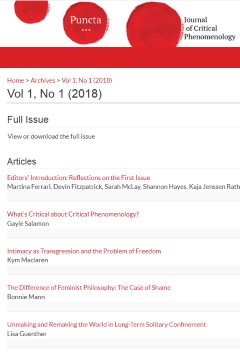What's critical about critical phenomenology?
pp. 8-17
Abstract
This essay considers what is critical in critical phenomenology, and asks what features critical and phenomenological methods share. I suggest three fundamentally significant resonances between the critical and phenomenological enterprises. First is the suggestion that critique, like phenomenology, is an attempt to move beyond a dualism of inside and outside in order to extend into outer regions of what is known. Second is the insistence that what at first appears to be a purely negative endeavor, a finding of limit, is incomplete if, upon finding that limit, it comes to a stop. Just as the reduction is not a means to banish or negate the world, but rather the condition through which it can more fully emerge, critique cannot be merely a cataloguing of the limitations of the present situation. Third is the openness to the possibilities of the world, a wonder or curiosity, that is revealed through the work of description in phenomenology, or Foucault’s characterization of philosophy not as an unmasking, but a making visible of what is visible. Finally I consider critical phenomenology’s futures: How is a newly enlivened kind of scholarship emerging from these two forms of thinking, both of which have been dismissed as outmoded or irrelevant? The new work currently emerging in phenomenology, with its emphasis on its own reflexive self-consideration and decolonization, offers hope that it might yet be capacious enough to simultaneously encompass the revelation of its limitations as well as the expansion of its reach.
Publication details
Published in:
Ferrari Martina, Fitzpatrick Devin, McLay Sarah, Hayes Shannon, Jenssen Rathe Kaja (2018) Puncta: Journal of Critical Phenomenology 1 (1).
Pages: 8-17
DOI: 10.31608/PJCP.v1i1.2
Full citation:
Salamon Gayle (2018) „What's critical about critical phenomenology?“. Puncta: Journal of Critical Phenomenology 1 (1), 8–17.


